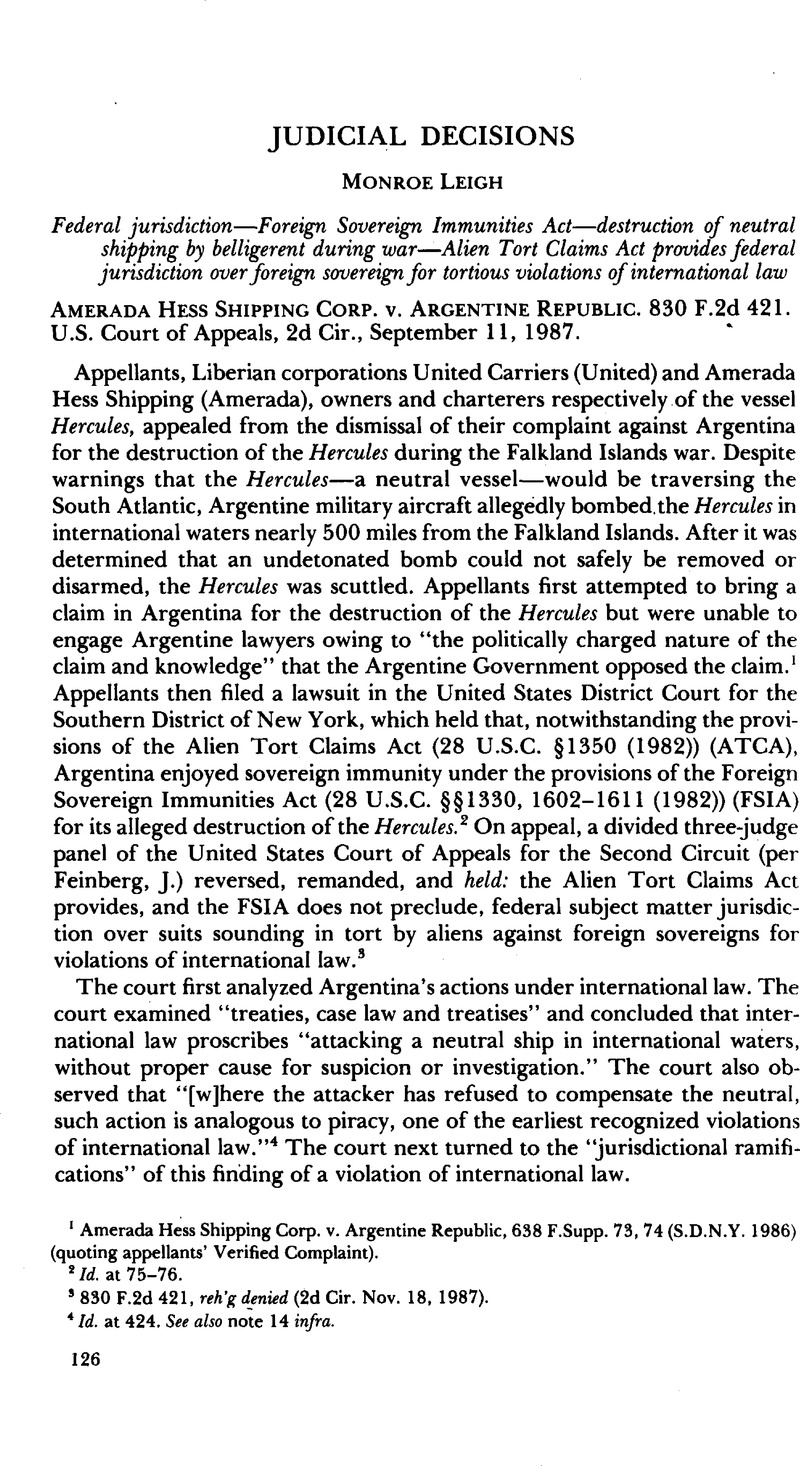Article contents
Amerada Hess Shipping Corp. v. Argentine Republic
Published online by Cambridge University Press: 27 February 2017
Abstract

- Type
- Judicial Decisions
- Information
- Copyright
- Copyright © American Society of International Law 1988
References
1 Amerada Hess Shipping Corp. v. Argentine Republic, 638 F.Supp. 73, 74 (S.D.N.Y. 1986) (quoting appellants’ Verified Complaint).
2 Id. at 75–76.
3 830 F.2d 421, reh’g denied (2d Cir. Nov. 18, 1987).
4 Id. at 424. See also note 14 infra.
5 830 F.2d at 424–25 (quoting 28 U.S.C. §1350 (1982)).
6 Id. at 425.
7 Id. The court cited as support for this proposition a case where the Supreme Court held that “ ‘the prize property which [the vessel] brings into our ports is liable to the jurisdiction of our Courts,’ notwithstanding any claim of sovereign immunity.” Id. (quoting The Santissima Trinidad, 20 U.S. (7 Wheat.) 283, 354 (1822)).
8 Id. (relying on Paust, Federal Jurisdiction over Extraterritorial Acts of Terrorism and Nonimmunity for Foreign Violators of International Law under the FSIA and the Act of State Doctrine, 23 Va. J. Int’l L. 191, 221–32 (1983); Bazyler, Litigating the International Law of Human Rights: A “How To” Approach, 7 Whittier L. Rev. 713, 733–34 (1985)Google Scholar).
9 Id. at 426.
10 Id.
11 Id.
12 Id. at 427.
13 Id. (quoting H.R. Rep. No. 1487, 94th Cong., 2d Sess. 6613 (1976), reprinted in 1976 U.S. Code Cong. & Admin. News 6604) (emphasis by court)).
14 Id.
15 The court briefly examined whether the assertion of personal jurisdiction over Argentina satisfied constitutional standards and found that it did because Argentina’s actions were “sufficiently related to the United States for Argentina to have been on notice that it might be sued here.” Id. at 428.
The court also speculated that Argentina’s actions in bombing the Hercules might have amounted to piracy. Id. at 424. This seems clearly incorrect, however, in light of the requirement that a piratical act be “committed for private ends.” Art. 101(a), Convention on the Law of the Sea, opened for signature Dec. 10, 1982, reprinted in United Nations, The Law of the Sea: United Nations Convention on The Law of the Sea, UN Sales No. E.83.V.5 (1983).
16 830 F.2d at 430 (Kearse, J., dissenting).
17 Id. at 429. Judge Kearse’s reasoning echoes somewhat that of the district court. The district court, in rejecting appellants’ argument that the ATCA provided jurisdiction, also noted that the federal courts “are courts of limited jurisdiction.” Amerada, 638 F.Supp. at 76. The district court also observed that “[p]erhaps Congress could empower federal courts to hear cases such as this,” but found itself “constrained by Congress’s failure to do so.” Id.
18 830 F.2d at 430 (Kearse, J., dissenting) (quoting H.R. Rep. No. 1487, supra note 13,1976 U.S. Code Cong. & Admin. News at 6610).
19 In re Korean Air Lines Disaster of September 1, 1983, Misc. No. 83–0345, slip op. at 11 (D.D.C Sept. 1, 1985). See also Siderman v. Republic of Argentina, No. CV 82–1772-RMT (MCx), slip op. at 3 (CD. Cal. Mar. 9, 1985) (ATCA “does not provide an exemption to foreign sovereign immunity”).
- 2
- Cited by




